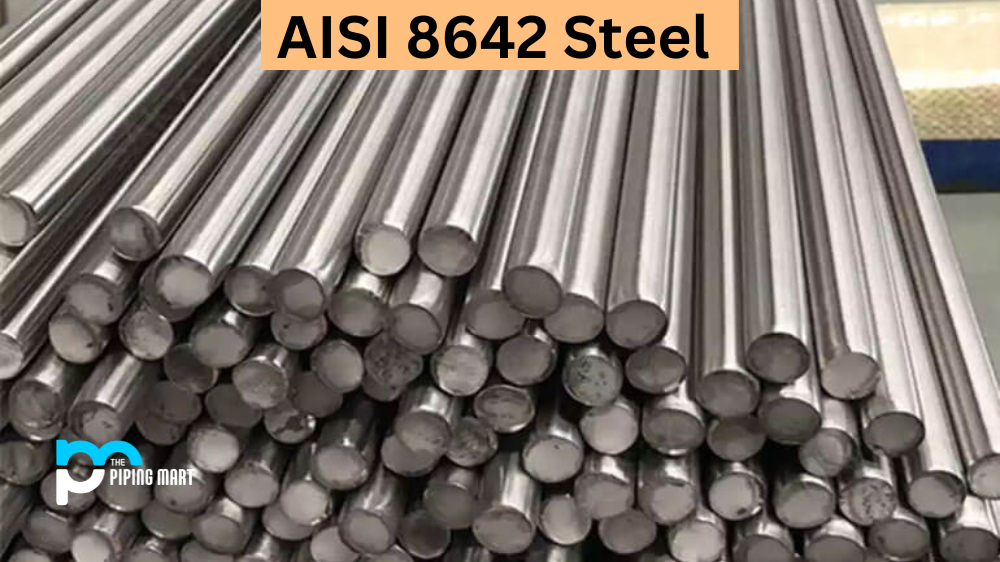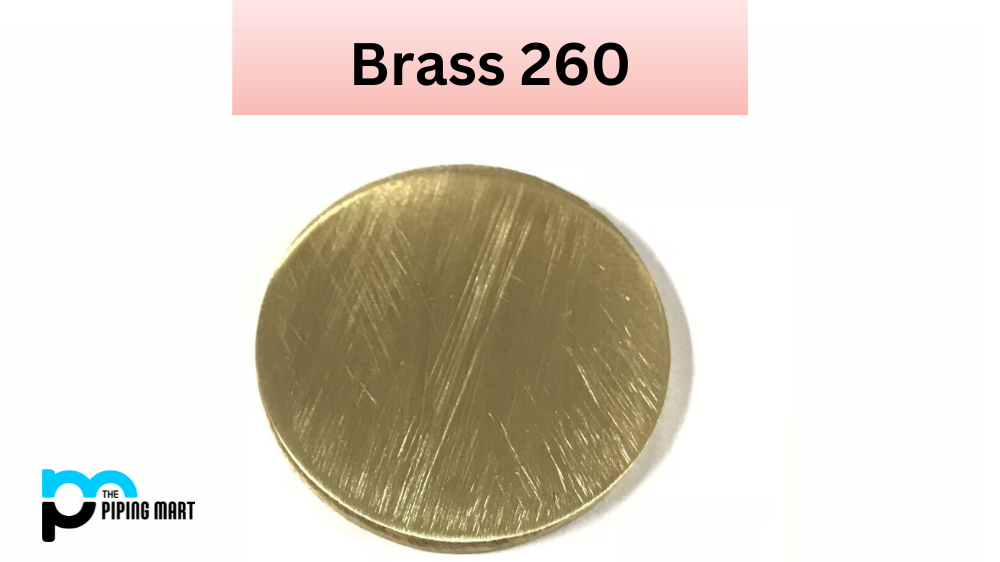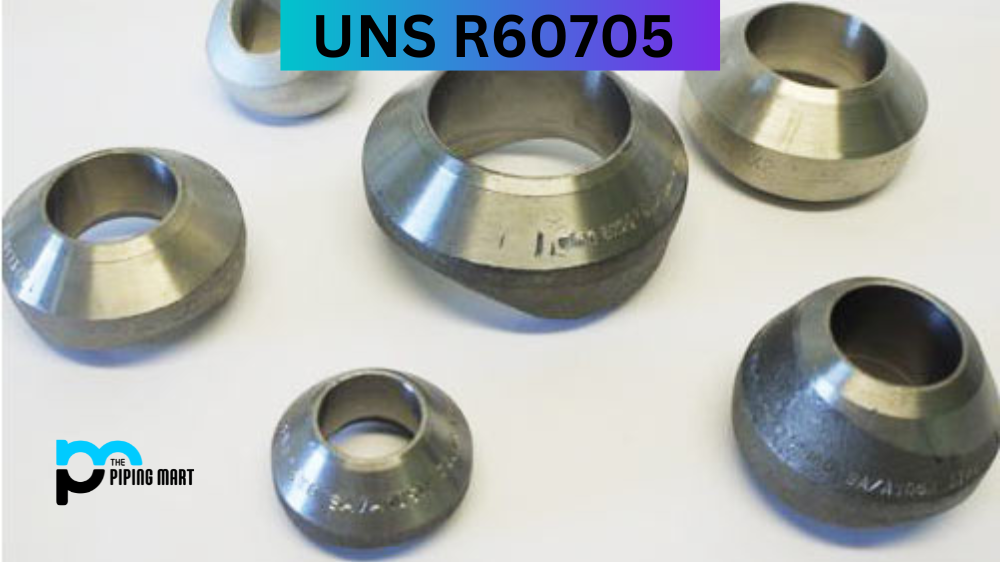AISI 8642, an alloy steel characterized by high carbon and chromium content, stands out for its outstanding corrosion resistance and favorable response to heat treatment. It has gained widespread acceptance within the machining industry due to its ability to withstand extreme temperatures and maintain strength in corrosive surroundings. Recognized as both SAE-AISI 8642 steel and SAE 8642, this low alloy steel has become an essential component in manufacturing. AISI 8642 Alloy Steel earns high regard for its exceptional mechanical properties, highlighting impressive strength, toughness, and wear resistance. Its composition, enriched with crucial elements such as chromium, manganese, and nickel, contributes to a distinctive combination of properties. Frequently, heat treatment is applied to refine and enhance its already remarkable characteristics further.
What Forms of AISI 8642 is Available at Piping Mart?
- Nut
- Bar
- Bolt
- Pipe
- Screw
- Tubing
- Valves
- Washers
- Flanges
- Fasteners
- Electrodes
- Stud Bolts
- Sheet Plates
- Pipe Fittings
- Forged Fitting
- Instrumentation Fittings
AISI 8642 Chemical Composition
AISI 8642 alloy steel comprises high levels of carbon chromium, manganese and nickel. This unique chemical composition contributes to its exceptional mechanical properties, including notable strength, toughness, and wear resistance. Heat treatment is commonly employed to further enhance its performance characteristics.
| Element | Content (%) |
|---|---|
| Iron, Fe | 96.585 – 97.93 |
| Chromium, Cr | 0.75 – 1.2 |
| Manganese, Mn | 0.65 – 1.1 |
| Carbon, C | 0.37 – 0.44 |
| Molybdenum, Mo | 0.15 – 0.3 |
| Silicon, Si | 0.15 – 0.3 |
| Sulfur, S | ≤0.040 |
| Phosphorous, P | ≤0.035 |
AISI 8642 Physical Properties
AISI 8642 exhibits excellent physical properties, strength, toughness, and wear resistance. Its unique composition and featuring elevated carbon and chromium levels, contributes to its robust performance. This alloy withstands extreme temperatures and corrosive environments. Heat treatment enhances its characteristics, making AISI 8642 a reliable choice for diverse industrial applications.
| Properties | Metric | Imperial |
|---|---|---|
| Density | 7.85 g/cm3 | 0.284 lb/in3 |
AISI 8642 Mechanical Properties
AISI 8642 showcases impressive mechanical properties. Including high strength, exceptional Toughness, and Notable wear resistance. Its composition, rich in carbon, chromium, manganese, and nickel, contributes to these qualities. Through heat treatment, these properties are further enhanced, making AISI 8642 a reliable and durable material for various mechanical applications.
| Properties | Metric | Imperial |
|---|---|---|
| Tensile strength | 903 MPa | 131000 psi |
| Yield strength | 738 MPa | 107000 psi |
| Modulus of elasticity | 205 GPa | 29700 ksi |
| Bulk modulus | 140 GPa | 20300 ksi |
| Shear modulus | 80 GPa | 11600 ksi |
| Poisson’s ratio | 0.29 | 0.29 |
| Elongation at break | 20.40% | 20.40% |
| Hardness, Brinell | 269 | 269 |
| Hardness, Vickers | 284 | 284 |
| Hardness, Knoop | 294 | 294 |
| Hardness, Rockwell C | 27 | 27 |
| Hardness, Rockwell B | 99 | 99 |
| Machinability | 65 | 65 |
AISI 8642 Thermal Properties
| Properties | Metric | Imperial |
|---|---|---|
| Thermal conductivity | 46.6 W/mK | 323 BTU.in/hrft².°F |
AISI 8642 Equivalent
- ASTM A322
- ASTM A331
- ASTM A505
- ASTM A519
- SAE J404
- SAE J412
- SAE J770
AISI 8642 Uses
UNS G86420 is widely used in the automotive industry for parts such as crankshafts, camshafts, gears, engine blocks and other components that require superior strength. It is also commonly used in the aerospace industry for aircraft engine components as well as turbine blades due to its excellent heat resistance properties.
AISI 8642 Uses in Industries
- Construction Industry
- Automotive Industry
- Aerospace Industry
- Oil and Gas Industry
- Machinery Manufacturing
AISI 8642 Corrosion Resistance
AISI 8642 offers excellent corrosion resistance due to its high chromium content. Which helps form a protective layer on the surface of the material. This protective layer prevents oxidation of the metal by preventing exposure to water or other corrosive substances like acids or alkalis. The presence of molybdenum further increases its corrosion resistance properties by providing additional protection against pitting and crevice corrosion.
AISI 8642 Heat Resistance
AISI 8642 can withstand high temperatures without losing any of its strength or becoming brittle. Its melting point is 3350°F (1836°C). Making it suitable for many applications requiring high-temperature performance, such as automotive engines or aerospace components. Its thermal conductivity is 12 BTU/ft-hr-°F (20 W/m-K).
AISI 8642 Heat Treatment
Heat treatment of AISI 8642 involves heating it up to a certain temperature and then cooling it down rapidly in order to obtain desired mechanical properties such as hardness or toughness. This process can be done using different techniques, such as quenching or tempering, depending on the type of mechanical properties desired for a particular application. The most common technique used with this type of steel is quenching followed by tempering, which allows for more controlled results in terms of mechanical properties while still ensuring adequate toughness and wear resistance levels are achieved.
AISI 8642 Machining
Due to its relatively low carbon content, AISI 8642 can be machined easily using standard tools such as drills and taps without suffering from rapid tool wear or breakage caused by abrasive materials like aluminium oxide, which can occur at higher carbon contents. This makes it an ideal choice for parts that require precise tolerances and surface finishes without the excessive cost incurred from replacing worn-out tools frequently during production runs.
Conclusion:
AISI 8642 steel is a great option for applications requiring superior strength and heat resistance while being able to withstand corrosive environments with ease due to its protective layer formed by chromium content present within the alloy. It also has good machinability thanks to its low carbon content, which allows standard tools like drills and taps to be utilized without suffering from excessive tool wear or breakage caused by abrasive materials encountered during production runs. As such, it’s no surprise why this type of steel has become increasingly popular in many industries, including automotive manufacturing and aerospace engineering, where superior performance against extreme conditions is required from their components. With all these benefits combined, there’s no doubt why AISI 8642 should be strongly considered when looking for an alloy steel solution for your next project!

Abhishek is a seasoned blogger and industry expert, sharing his insights and knowledge on various topics. With his research, Abhishek offers valuable insights and tips for professionals and enthusiasts. Follow him for expert advice on the latest trends and developments in the metal industry.




